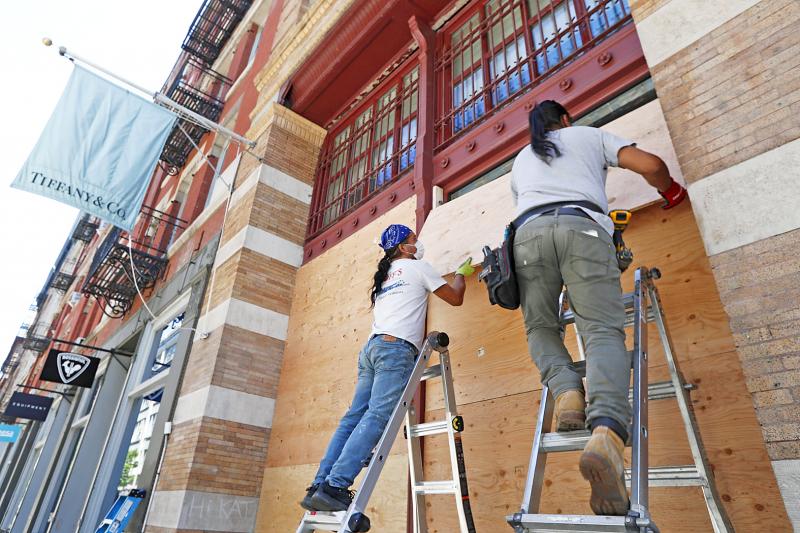Tiffany & Co shares plunged after Women’s Wear Daily reported LVMH Moet Hennessy Louis Vuitton SE’s deal to buy the luxury jewelry company is uncertain as the US economy faces widespread upheaval.
LVMH board members arranged to meet on Tuesday to discuss the proposed deal, the trade journal said, citing unidentified individuals.
Board members are concerned about the COVID-19 pandemic, which has disrupted the US economy, and growing unrest over police violence, it said.

Photo: AP
They also expressed concern about Tiffany’s ability to cover its debt covenants at the end of the transaction, it added.
Tiffany representatives did not immediately respond to a request for comment. LVMH declined to comment.
The French company’s shares rose 0.8 percent in early trading in Paris yesterday.
Tiffany shares, which were halted for several minutes due to volatility, on Tuesday fell as much as 13 percent, the steepest intraday drop since 2015, before closing down 8.9 percent.
“I would imagine it is normal that LVMH internally discusses the proposed Tiffany acquisition — given the size of the deal, the COVID-19 situation and the recent social unrest in the US,” Sanford C. Bernstein analyst Luca Solca wrote. “Having said that, the Tiffany takeover would provide a unique strategic opportunity to LVMH, boosting its position in branded jewelry.”
It is an “open question” whether LVMH would try to renegotiate better terms, Solca said.
The economic fallout from the pandemic has disrupted or derailed a number of prominent deals, including L Brands Inc’s agreement to sell a majority stake in Victoria’s Secret to private equity firm Sycamore Partners.
If the LVMH-Tiffany tie-up falls apart, it would be one of the largest related to COVID-19.
The New York-based jeweler’s Web site said that as of Monday, its stores are temporarily closed until further notice.
The pandemic has also affected the company’s ability to offer next-day and express shipping.
The stores went dark in mid-March due to a pandemic lockdown. Some of its locations have had their windows boarded up as protests roil cities across the country.
LVMH’s planned purchase of Tiffany for more than US$16 billion has been the subject of speculation after the pandemic suddenly altered the consumer landscape worldwide.
Prior to the lockdown, 183-year-old Tiffany was struggling with a lull in international tourist traffic and civil unrest in Hong Kong. In the US, management has worked to attract younger clientele, although sales have been slow to rebound.

SEMICONDUCTORS: The German laser and plasma generator company will expand its local services as its specialized offerings support Taiwan’s semiconductor industries Trumpf SE + Co KG, a global leader in supplying laser technology and plasma generators used in chip production, is expanding its investments in Taiwan in an effort to deeply integrate into the global semiconductor supply chain in the pursuit of growth. The company, headquartered in Ditzingen, Germany, has invested significantly in a newly inaugurated regional technical center for plasma generators in Taoyuan, its latest expansion in Taiwan after being engaged in various industries for more than 25 years. The center, the first of its kind Trumpf built outside Germany, aims to serve customers from Taiwan, Japan, Southeast Asia and South Korea,

POWERING UP: PSUs for AI servers made up about 50% of Delta’s total server PSU revenue during the first three quarters of last year, the company said Power supply and electronic components maker Delta Electronics Inc (台達電) reported record-high revenue of NT$161.61 billion (US$5.11 billion) for last quarter and said it remains positive about this quarter. Last quarter’s figure was up 7.6 percent from the previous quarter and 41.51 percent higher than a year earlier, and largely in line with Yuanta Securities Investment Consulting Co’s (元大投顧) forecast of NT$160 billion. Delta’s annual revenue last year rose 31.76 percent year-on-year to NT$554.89 billion, also a record high for the company. Its strong performance reflected continued demand for high-performance power solutions and advanced liquid-cooling products used in artificial intelligence (AI) data centers,

Gasoline and diesel prices at domestic fuel stations are to fall NT$0.2 per liter this week, down for a second consecutive week, CPC Corp, Taiwan (台灣中油) and Formosa Petrochemical Corp (台塑石化) announced yesterday. Effective today, gasoline prices at CPC and Formosa stations are to drop to NT$26.4, NT$27.9 and NT$29.9 per liter for 92, 95 and 98-octane unleaded gasoline respectively, the companies said in separate statements. The price of premium diesel is to fall to NT$24.8 per liter at CPC stations and NT$24.6 at Formosa pumps, they said. The price adjustments came even as international crude oil prices rose last week, as traders

SIZE MATTERS: TSMC started phasing out 8-inch wafer production last year, while Samsung is more aggressively retiring 8-inch capacity, TrendForce said Chipmakers are expected to raise prices of 8-inch wafers by up to 20 percent this year on concern over supply constraints as major contract chipmakers Taiwan Semiconductor Manufacturing Co (TSMC, 台積電) and Samsung Electronics Co gradually retire less advanced wafer capacity, TrendForce Corp (集邦科技) said yesterday. It is the first significant across-the-board price hike since a global semiconductor correction in 2023, the Taipei-based market researcher said in a report. Global 8-inch wafer capacity slid 0.3 percent year-on-year last year, although 8-inch wafer prices still hovered at relatively stable levels throughout the year, TrendForce said. The downward trend is expected to continue this year,